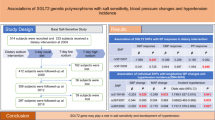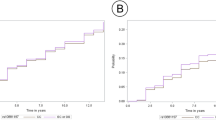Abstract
It is important to understand what genetic risk factors lead to hypertension and how genotype-specific dietary and lifestyle modification can mitigate the risk of developing hypertension. The ATP2B1 rs17249754 gene, which encodes a calcium pump expressed in vascular smooth muscle was identified as having variants that conferred higher or lower risk of hypertension—with the major allele carriers being increased at risk. However, the effects of dietary intakes on risk of hypertension among carriers of the different alleles have not been fully elucidated. Therefore, we evaluated ATP2B1 rs17249754 and its interaction with dietary intakes of sodium (Na), potassium (K) and calcium (Ca) on the risk of developing hypertension using the Ansan/Ansung (n=8842) and City-Rural (n=5512) cohorts from the Korean Genome and Epidemiology Study. Carriers of the major allele of ATP2B1 rs17249754 were at greater risk of developing hypertension and high Na intake and low Ca increased the risk more in major allele than among minor allele carriers. High potassium intake was more protective against hypertension in the subjects expressing minor alleles and a low Na/K intake ratio was the most consistently beneficial to the subjects expressing the minor allele. When controlling for Na and K, low Ca intake was associated with a substantially higher risk for high systolic blood pressure in the major allele carriers compared with minor allele, suggesting good calcium status is especially important for the major allele carriers. In conclusion, people with the major allele of ATP2B1 rs17249754 are susceptible to hypertension especially in low intake of Ca and high ratio of Na and K.
This is a preview of subscription content, access via your institution
Access options
Subscribe to this journal
Receive 12 digital issues and online access to articles
$119.00 per year
only $9.92 per issue
Buy this article
- Purchase on Springer Link
- Instant access to full article PDF
Prices may be subject to local taxes which are calculated during checkout

Similar content being viewed by others
References
Lim SS, Vos T, Flaxman AD, Danaei G, Shibuya K, Adair-Rohani H et al. A comparative risk assessment of burden of disease and injury attributable to 67 risk factors and risk factor clusters in 21 regions, 1990-2010: a systematic analysis for the Global Burden of Disease Study 2010. Lancet 2012; 380: 2224–2260.
Chobanian AV, Bakris GL, Black HR, Cushman WC, Green LA, Izzo JL et al. The Seventh Report of the Joint National Committee on Prevention, Detection, Evaluation, and Treatment of High Blood Pressure: the JNC 7 report. JAMA 2003; 289: 2560–2572.
Shin J, Park JB, Kim KI, Kim JH, Yang DH, Pyun WB et al2013 Korean Society of Hypertension guidelines for the management of hypertension: part I-epidemiology and diagnosis of hypertension. Clin Hypertens 2015; 21: 1.
Ndanuko RN, Tapsell LC, Charlton KE, Neale EP, Batterham MJ . Dietary patterns and blood pressure in adults: a systematic review and meta-analysis of randomized controlled trials. Adv Nutr 2016; 7: 76–89.
2010 Korean National Health Statistics 2010 Korean National Health and Nutrition Examination Survey. National Department of Public Health: Seoul: Korea, 2010.
Geleijnse JM, Kok FJ, Grobbee DE . Impact of dietary and lifestyle factors on the prevalence of hypertension in Western populations. Eur J Public Health 2004; 14: 235–239.
Park J, Lee JS, Kim J . Relationship between dietary sodium, potassium, and calcium, anthropometric indexes, and blood pressure in young and middle aged Korean adults. Nutr Res Pract 2010; 4: 155–162.
Kim BK, Lim YH, Kim SG, Kim YM, Shin J . Relationship between sodium intake and blood pressure according to metabolic syndrome status in the Korean National Health and Nutrition Examination Survey. Blood Press Monit 2012; 17: 120–127.
Levy D, Ehret GB, Rice K, Verwoert GC, Launer LJ, Dehghan A et al. Genome-wide association study of blood pressure and hypertension. Nat Genet 2009; 41: 677–687.
Xi B, Tang W, Wang Q . Polymorphism near the ATP2B1 gene is associated with hypertension risk in East Asians: a meta-analysis involving 15 909 cases and 18 529 controls. Blood Press 2012; 21: 134–138.
Hong KW, Go MJ, Jin HS, Lim JE, Lee JY, Han BG et al. Genetic variations in ATP2B1, CSK, ARSG and CSMD1 loci are related to blood pressure and/or hypertension in two Korean cohorts. J Hum Hypertens 2010; 24: 367–372.
Kim Y, Han BG . Cohort Profile: The Korean Genome and Epidemiology Study (KoGES) Consortium. Int J Epidemiol 2017; 46: e20.
Park S, Daily JW, Zhang X, Jin HS, Lee HJ, Lee YH . Interactions with the MC4R rs17782313 variant, mental stress and energy intake and the risk of obesity in Genome Epidemiology Study. Nutr Metab 2016; 13: 38.
Rabbee N, Speed TP . A genotype calling algorithm for Affymetrix SNP arrays. Bioinformatics 2006; 22: 7–12.
Ahn Y, Kwon E, Shim JE, Park MK, Joo Y, Kimm K et al. Validation and reproducibility of food frequency questionnaire for Korean genome epidemiologic study. Eur J Clin Nutr 2007; 61: 1435–1441.
Daily JW, Park S . Interaction of BDNF rs6265 variants and energy and protein intake in the risk for glucose intolerance and type 2 diabetes in middle-aged adults. Nutrition 2017; 33: 187–194.
Prevention KCfDCa The Report of the Third Korea National Health and Nutrition Survey Control KCfD (ed.). Ministry of Health and Welfare: Seoul, 2005.
Cho YS, Go MJ, Kim YJ, Heo JY, Oh JH, Ban HJ et al. A large-scale genome-wide association study of Asian populations uncovers genetic factors influencing eight quantitative traits. Nat Genet 2009; 41: 527–534.
Xu J, Qian HX, Hu SP, Liu LY, Zhou M, Feng M et al. Gender-specific association of ATP2B1 variants with susceptibility to essential hypertension in the han chinese population. Biomed Res Int 2016; 2016: 1910565.
Lee S, Kim SH, Shin C . Interaction according to urinary sodium excretion level on the association between ATP2B1 rs17249754 and incident hypertension: the Korean genome epidemiology study. Clin Exp Hypertens 2016; 38: 352–358.
Park YM, Kwock CK, Kim K, Kim J, Yang YJ . Interaction between single nucleotide polymorphism and urinary sodium, potassium, and sodium-potassium ratio on the risk of hypertension in Korean adults. Nutrients 2017; 9: 235.
Lee HJ, Kang JO, Kim SM, Ji SM, Park SY, Kim ME et al. Gene silencing and haploinsufficiency of Csk increase blood pressure. PLoS ONE 2016; 11: e0146841.
Hu XQ, Zhang L . Function and regulation of large conductance Ca(2+)-activated K+ channel in vascular smooth muscle cells. Drug Discov Today 2012; 17: 974–987.
Hirawa N, Fujiwara A, Umemura S . ATP2B1 and blood pressure: from associations to pathophysiology. Curr Opin Nephrol Hypertens 2013; 22: 177–184.
Ko EA, Han J, Jung ID, Park WS . Physiological roles of K+ channels in vascular smooth muscle cells. J Smooth Muscle Res 2008; 44: 65–81.
Brozovich FV, Nicholson CJ, Degen CV, Gao YZ, Aggarwal M, Morgan KG . Mechanisms of vascular smooth muscle contraction and the basis for pharmacologic treatment of smooth muscle disorders. Pharmacol Rev 2016; 68: 476–532.
Fujiwara A, Hirawa N, Fujita M, Kobayashi Y, Okuyama Y, Yatsu K et al. Impaired nitric oxide production and increased blood pressure in systemic heterozygous ATP2B1 null mice. J Hypertens 2014; 32: 1415–1423.
Zemel MB . Calcium modulation of hypertension and obesity: mechanisms and implications. J Am Coll Nutr 2001; 20: 428S–435S.
Kempner W . Treatment of hypertensive vascular disease with rice diet. Am J Med 1948; 4: 545–577.
Cook NR, Obarzanek E, Cutler JA, Buring JE, Rexrode KM, Kumanyika SK et al. Joint effects of sodium and potassium intake on subsequent cardiovascular disease: the Trials of Hypertension Prevention follow-up study. Arch Intern Med 2009; 169: 32–40.
Adrogue HJ, Madias NE . Sodium and potassium in the pathogenesis of hypertension. N Engl J Med 2007; 356: 1966–1978.
Titze J . Estimating salt intake in humans: not so easy!. Am J Clin Nutr 2017; 105: 1253–1254.
Zhou L, Tian Y, Fu JJ, Jiang YY, Bai YM, Zhang ZH et al. Validation of spot urine in predicting 24-h sodium excretion at the individual level. Am J Clin Nutr 2017; 105: 1291–1296.
Hall JE, do Carmo JM, da Silva AA, Wang Z, Hall ME . Obesity-induced hypertension: interaction of neurohumoral and renal mechanisms. Circ Res 2015; 116: 991–1006.
Schutten MT, Houben AJ, de Leeuw PW, Stehouwer CD . The link between adipose tissue renin-angiotensin-aldosterone system signaling and obesity-associated hypertension. Physiology 2017; 32: 197–209.
Park S, Ahn J, Kim NS, Lee BK . High carbohydrate diets are positively associated with the risk of metabolic syndrome irrespective to fatty acid composition in women: the KNHANES 2007-2014. Int J Food Sci Nutr 2017; 68: 479–487.
Park S, Ahn J, Lee BK . Very-low-fat diets may be associated with increased risk of metabolic syndrome in the adult population. Clin Nutr 2016; 35: 1159–1167.
Acknowledgements
We acknowledge funding from the Korean Research Foundation in Korea (NRF-2015R1D1A3A01019577).
Author information
Authors and Affiliations
Corresponding author
Ethics declarations
Competing interests
The authors declare no conflict of interest.
Rights and permissions
About this article
Cite this article
Daily, J., Kim, B., Liu, M. et al. People with the major alleles of ATP2B1 rs17249754 increases the risk of hypertension in high ratio of sodium and potassium, and low calcium intakes. J Hum Hypertens 31, 787–794 (2017). https://doi.org/10.1038/jhh.2017.72
Received:
Revised:
Accepted:
Published:
Issue Date:
DOI: https://doi.org/10.1038/jhh.2017.72



